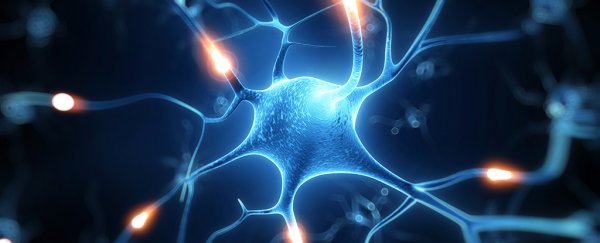There's hope for new treatments for neurological diseases, after scientists just discovered a link between the mobilisation of mitochondria inside nerve cells, and the cells' subsequent regrowth.
The team thinks that kicking the mitochondria into action could be the key to repairing damage done to the nervous system.
Mitochondria act as power supplies for cells, causing chemical reactions that give neurons the energy they need to extend nerve cells through the body. However, some aspects of the behaviour of mitochondria change over time.
In mature adult cells, mitochondria are locked in place by a protein called syntaphilin, which means they can't be as mobile as they are in younger cells. After taking steps to restore this mitochondrial mobility in groups of mice, researchers from the National Institute of Neurological Disorders and Stroke in the US observed the regeneration of damaged nerve cells.
To make this happen, the team genetically removed the syntaphilin protein from damaged nerve cells containing non-functioning mitochondria. This led to the regrowth of healthy mitochondria, and gave back the neurons' ability to restore themselves.
In the case of the mice used in the tests, the animals were able to regenerate large nerve cells called sciatic nerves that had been damaged by injury.
So getting these power plants moving again was enough to kickstart a chain reaction leading to nerve cell regrowth. The scientists behind the study say that knowing this could help us figure out how to restore nerve cells in the human body too, provided the same results can be achieved in clinical trials.
"Our in vivo and in vitro studies suggest that activating an intrinsic growth program requires the coordinated modulation of mitochondrial transport and recovery of energy deficits," explained lead researcher Zu-Hang Sheng. "Such combined approaches may represent a valid therapeutic strategy to facilitate regeneration in the central and peripheral nervous systems after injury or disease."
Unlike other cells in the body, neurons cannot repair themselves, which is why diseases such as Alzheimer's can be so devastating in terms of their impact on the body. But progress is being made, with researchers looking at ways to restore nerve cells after they're damaged, including injecting healthy neurons into the brain.
And this restoration of mitochondrial mobility might not be the only way these cell power plants can help scientists fight disease.
Some researchers think mitochondria could even hold the key to reversing ageing itself, because of the way mitochondrial DNA degrades over time as we get older. It's early days, but there's a huge amount of promise in this area of research.
The new findings are published in the Journal of Cell Biology.
